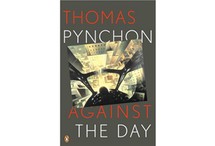Against the Day
By Thomas Pynchon
1085 pages;
Penguin
Great novelists serve as our x-ray machines, having trained themselves, over many years and with great effort, to see what is invisible to the rest of us. Thomas Pynchon is one of the two or three greatest novelists of his generation. His fiction is bawdy, comic, broad, and frequently surreal, but its underlying aim is nothing less than to represent ourselves to ourselves, to show us what we can't yet recognize in the patterns of our mad history. Hardly a few pages into his newest novel, Against the Day (Penguin), a corporate tycoon denounces a sci-fi-ish plan to harness the earth's electromagnetism to provide free energy to humanity for the rest of history as a threat to "the rational systems of control whose blessings we enjoy at present." Systems of control are Pynchon's perennial and most pressing concern, and they have become so thoroughly present, like the air around our heads, we can't even see them anymore. Pynchon has created a fabulous allegory to make us see. Against the Day begins with the Chicago World's Fair of 1893 and ends in the flapper years after the Great War. Across nearly 1,100 pages, it takes on a sequence of many recognizable but long unheard voices, like a kind of radio art. Pynchon's ability to "get" these voices and relive and evoke these worlds goes beyond the extraordinary into the miraculous. The prevailing tone is a marvelous parody of pulp fictions of the past, featuring such figures as the Chums of Chance, a group of young adventurers with a hydrogen dirigible. There are also a drifting photographer and a gumshoe detective, magicians' assistants and sinister tycoons, mad scientists and foreign evildoers, California starlets and "whores with tiny waists and huge darkened eyelids and lashes and sumptuously plumed hats." The book floats and drifts like its beautiful flying machines across major and minor matters of American history, known disasters, and relevant social movements. Pynchon's books, for all their wizardry and social and political insight, are fun—but they are large and they demand a certain bravery before diving in. They sway softly, blue and deep. Once you're in, you won't want to get out.
— Vince Passaro


